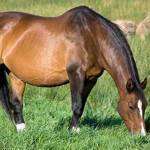Five Diet Tips to Maximize Mare Health in Late Pregnancy

Ensuring your mare’s colostrum and milk provides everything her foal needs for maximizing health, athleticism, and longevity starts long before parturition. Mare nutrition remains largely unchanged during the first two-thirds of gestation but thereafter requires monitoring and tweaking.
Five tips to maximize mare and foal health in late pregnancy and beyond:
- Provide enough, but not too much, energy. With three-quarters of a foal’s gestational growth occurring in the last three months of gestation, mares require extra energy during that period. Those extra calories usually come by increasing amounts of forage and adding a concentrate, stabilized rice bran, or vegetable oil. Carefully monitor the mare’s body condition score. Overweight pregnant mares may not foal as easily, may produce milk of poorer quality than thinner peers, and may have trouble conceiving on rebreed attempts.
- Offer vitamin E to boost colostrum quality. Studies show that supplementing pregnant mares with vitamin E prior to foaling with products such as Nano-E, available through Kentucky Equine Research (KER), can boost the levels of infection-fighting proteins called immunoglobulins.
- Embrace the power of omega-3 fatty acids. Like vitamin E, supplementing pregnant mares with omega-3 fatty acids also appears to improve the quality of colostrum. In fact, offering marine-derived omega-3 fatty acids such as EO-3, also developed by KER, packs colostrum with more than just immunoglobulins. Marine-derived omega-3 fatty acids increase docosahexaenoic acid (DHA) levels in milk.
- Harness the power of yeast. Offering a probiotic yeast such as Saccharomyces cerevisiea can improve the mare’s own immune system (e.g., in response to vaccination) and bolster colostrum quality as well.
- Manage the mare’s microbiota with MOS. In addition to addressing the immune system and colostrum, optimal mare health involves keeping the intestinal tract and cecum healthy, including her microbiota—the population of beneficial microbes that help protect horses against disease-causing organisms like Salmonella and Escherichia coli. While nutritional supplementation with prebiotics, probiotics, and yeast (e.g., Saccharomyces cerevisiae) or yeast fermentates are advocated for maintaining a healthy microbiota, science shows that products containing specific molecules called mannan oligosaccharides (MOS) extracted from the cell wall of yeast might be an even better supplementation strategy.
“MOS are chains of sugars, sometimes attached to small proteins, that have the ability to bind to pathogenic bacteria and stopping the disease-causing organisms from attaching to the lining of the intestine and replicating,” explained Peter Huntington, B.V.Sc., M.A.C.V.Sc., director of nutrition at KER (Australia).
MOS are also thought to enhance immunity, serving as an antioxidant, like Nano-E.
Specific to horses, MOS offers a natural approach to support the microflora and thus improve overall health, well-being, and longevity,” described a group of researchers in a recent review article on MOS in farm and companion animals*.
They went on to explain that pregnant mares supplemented with MOS:
- Had increased levels of infection-fighting proteins (immunoglobulins) in their blood, and
- Produced colostrum with higher levels of immunoglobulins (Ig) G, M, and A, which could bolster a foal’s ability to fight infection in the postnatal period.
In addition, foals born from mares supplemented with MOS had higher circulating levels of IgA and a lower incidence of diarrhea. MOS supplementation of mares is also believed to assist in establishing the foal’s microbiota.
The researchers mentioned, “Horses in training may benefit from improved immune response associated with supplementation of MOS, though this needs to be verified.”
“Avoiding abrupt changes in diet and using hindgut buffers like EquiShure during times of stress or prior to transport will also help maintain a healthy microbiota and gastrointestinal tract,” recommended Huntington.
*Spring, P. C. Wenk, and A. Kiers. 2015. A review of 733 published trials on Bio-Mos®, a mannan oligosaccharide, and Actigen®, a second generation mannose rich fraction, on farm and companion animals. Journal of Applied Animal Nutrition. 3:e8.








